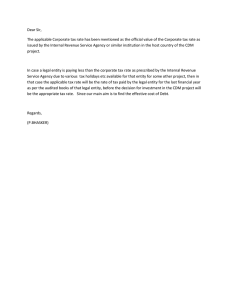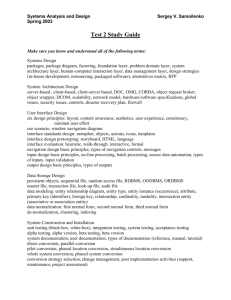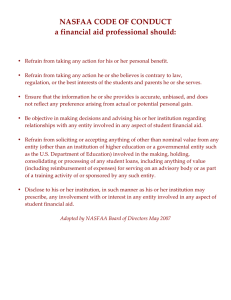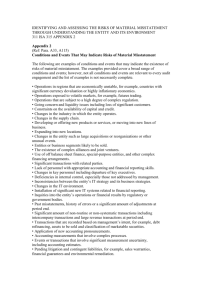Fortunately, We May Not Have Time Alexis Liston, Gustavus Adolphus College Abstract
advertisement
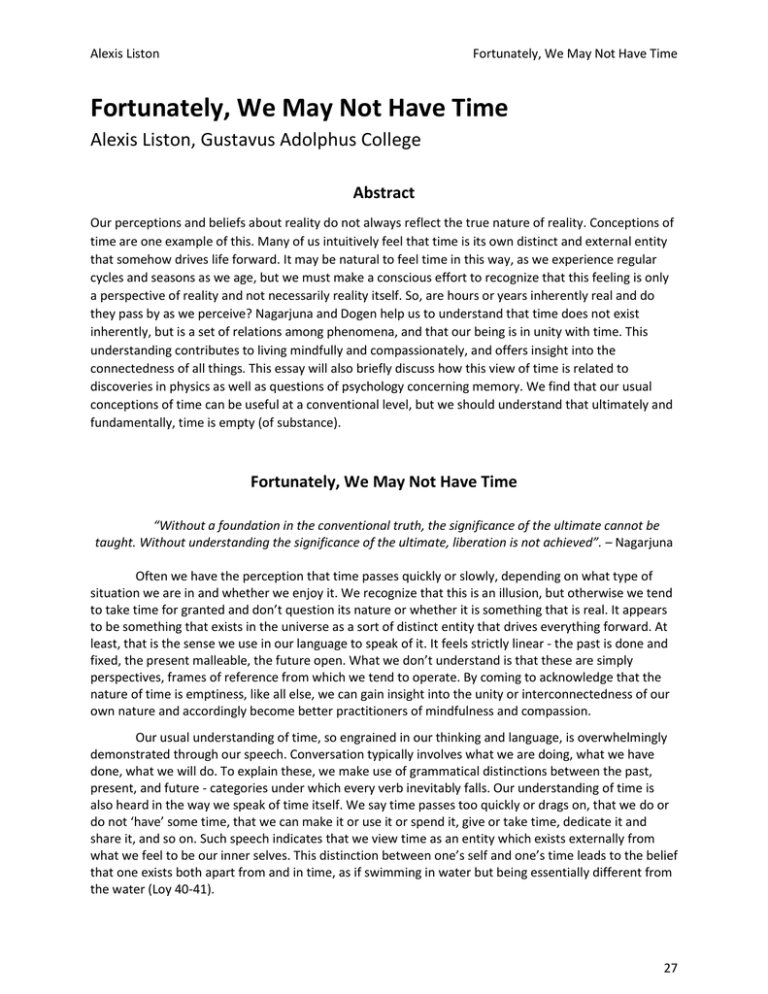
Alexis Liston Fortunately, We May Not Have Time Fortunately, We May Not Have Time Alexis Liston, Gustavus Adolphus College Abstract Our perceptions and beliefs about reality do not always reflect the true nature of reality. Conceptions of time are one example of this. Many of us intuitively feel that time is its own distinct and external entity that somehow drives life forward. It may be natural to feel time in this way, as we experience regular cycles and seasons as we age, but we must make a conscious effort to recognize that this feeling is only a perspective of reality and not necessarily reality itself. So, are hours or years inherently real and do they pass by as we perceive? Nagarjuna and Dogen help us to understand that time does not exist inherently, but is a set of relations among phenomena, and that our being is in unity with time. This understanding contributes to living mindfully and compassionately, and offers insight into the connectedness of all things. This essay will also briefly discuss how this view of time is related to discoveries in physics as well as questions of psychology concerning memory. We find that our usual conceptions of time can be useful at a conventional level, but we should understand that ultimately and fundamentally, time is empty (of substance). Fortunately, We May Not Have Time “Without a foundation in the conventional truth, the significance of the ultimate cannot be taught. Without understanding the significance of the ultimate, liberation is not achieved”. – Nagarjuna Often we have the perception that time passes quickly or slowly, depending on what type of situation we are in and whether we enjoy it. We recognize that this is an illusion, but otherwise we tend to take time for granted and don’t question its nature or whether it is something that is real. It appears to be something that exists in the universe as a sort of distinct entity that drives everything forward. At least, that is the sense we use in our language to speak of it. It feels strictly linear - the past is done and fixed, the present malleable, the future open. What we don’t understand is that these are simply perspectives, frames of reference from which we tend to operate. By coming to acknowledge that the nature of time is emptiness, like all else, we can gain insight into the unity or interconnectedness of our own nature and accordingly become better practitioners of mindfulness and compassion. Our usual understanding of time, so engrained in our thinking and language, is overwhelmingly demonstrated through our speech. Conversation typically involves what we are doing, what we have done, what we will do. To explain these, we make use of grammatical distinctions between the past, present, and future - categories under which every verb inevitably falls. Our understanding of time is also heard in the way we speak of time itself. We say time passes too quickly or drags on, that we do or do not ‘have’ some time, that we can make it or use it or spend it, give or take time, dedicate it and share it, and so on. Such speech indicates that we view time as an entity which exists externally from what we feel to be our inner selves. This distinction between one’s self and one’s time leads to the belief that one exists both apart from and in time, as if swimming in water but being essentially different from the water (Loy 40-41). 27 Alexis Liston Fortunately, We May Not Have Time Such conceptions of time are influenced by experiences of time, and vice versa - experiences of time are influenced by these conceptions. On the one hand, the experience of time is natural and very basic to our experience of life. Our bodies undergo a daily circadian cycle as the earth rotates around the sun, and we see many changes as we age. It seems natural that our thinking and language would incorporate these experiences by designating categories (or tenses) of time to include past, present, and future as well as units like hours, days, years, etc. We must be careful though. The first lines of the Dhammapada say, “All experience is preceded by mind, led by mind, made by mind” (Fronsdal 1). Considering this, our designations and categories of time also lead to particular ways of experiencing time, separating us from the experience of time as it really is and ultimately leading to delusion and duhkha (translated as suffering, or dissatisfaction) (Loy - ‘self’ is duhkha). We begin to think that an hour is something that we possess or that passes by us, and we become selfishly possessive of ‘our’ time, and worry that ‘my’ time will end in my death (Loy 38). This kind of thought is reinforced by (and reinforces) essentialist views of the self, since then the self can indeed be something essentially different and separate from its surroundings (‘swimming in water’). It becomes clear that understanding the nature of time and understanding our own nature are closely intertwined. If we hope to understand our nature, we find that we must understand the nature of time and ultimately, of all reality. Dogen, the famous Japanese Zen master, addresses the misconceptions of time and offers insight in his essay The Time-Being. Immediately and all throughout the writing, he emphasizes that “time itself is being, and all being is time” (Dogen 76). The two are inseparable. He urges, “Do not think that time merely flies away. Do not see flying away as the only function of time. If time merely flies away, you would be separate from time. The reason you do not clearly understand the time-being is that you think of time only as passing” (Dogen 78). Dogen’s non-dual perspective is grounded in Nagarjuna’s insight into the two truths of reality, dependent origination and emptiness, as well as his examination of time based on the two truths. The first chapter of Mulamadhyamakakarika establishes that phenomena are empty of any essence and do not inherently exist in causes (Garfield 4-5). Causes are thought to come in order before effects – and effects somehow emerge from causes, as if existing in them. What if we apply this thought to time? What we find is that past, present, and future do not exist in themselves as entities, just as causes and effects do not inherently exist – and, how effects do not exist inherently in causes. “If the present and the future depend on the past, then the present and the future would have existed in the past” (Garfield 50). This is clearly a problem - the present and the future do not exist simultaneously in time with the past. Nor can the parts of time exist independently from one another - the very experience and definition of time involve the ordering of events in relation to one another. For example, if there are no past and future, it is meaningless to speak of a reified present (since present is what comes between past and future). “So either the present is in the past, in which case it is nonexistent, or it is independent of the past and the future, in which case it is nonexistent” (Garfield 256). Another problem with viewing time as an entity is that an entity either changes or doesn’t change. If time itself changes, then there must be some “super-time in which that change occurs” (Garfield 256) (an infinite regress would follow). If time as an entity is static, then all three parts of time must somehow exist simultaneously. We cannot think of time as an entity - but again it must depend on some ‘other’ entity for its existence. “If time depends on an entity, then without an entity how could time exist? There is no existent entity. So how can time exist?” (Garfield 256) Garfield offers a most precise explanation and conclusion to Nagarjuna’s argument: But this final verse...contains Nagarjuna’s positive account of the nature of time. Nagarjuna points out that with no entities to be temporally related, there is no time. 28 Alexis Liston Fortunately, We May Not Have Time That is, the only mode of existence that time has is as a set of relations among empirical phenomena. Apart from these phenomena and those relations, there is no time. But that means that, given the lack of inherent existence of phenomena, there can be no inherent existence of time. Time is thus merely a dependent set of relations, not an entity in its own right, and certainly not the inherently existent vessel of existence it might appear to be. (Garfield 257) Once we have a strong grasp on Nagarjuna’s insight, we can understand more clearly Dogen’s analysis of the nature of being and time as a time-being unity. Time relies on being for existence, as Nagarjuna showed, and Dogen also sees the other side of this coin, that being relies on time for existence. “Mountains are time. Oceans are time. If they were not time, there would be no mountains or oceans...If time is annihilated, mountains and oceans are annihilated” (Dogen 81). Another expression of it could be, “No time, no things” (David Loy - Zen teacher and author - 42). It is true for everything, people included. Loy, in Money, Sex, War, Karma, provides examples to demonstrate our relationship to time. He demonstrates that our understanding of time relies on relational perspective by using the analogy of an island amidst a sea. The island, standing stationary, would be a reference point from which to measure the movement of the current flowing by. The island is our usual sense of self. If there is no unmoving island, though, the movement of current cannot be measured. In the analogy, we are floating on a dinghy with the current, and thereby have no contrasting perspective from which to see time in the way we usually think we do. We flow with time - we are time. So, our measurements cannot be much more than artificial and relative. Wittgenstein’s quote from Philosophical Investigations can provide perspective as well: You surely know what 'It is 5 o'clock here' means; so you also know what 'It's 5 o'clock on the sun' means. It means simply that it is just the same there as it is here when it is 5 o'clock. This is absurd, of course. What we understand to be 5 o’clock depends on our perspective of the sun from earth and the system of divisions we’ve designated to the sun’s apparent motion. Then we can’t really say that there is such a unit as an hour in the universe apart from the unit of time which we have designated to be an hour (since time must be a measure of event or change - here, earth’s rotation around sun). There is ultimately no hour to be possessed or to pass by. This perspective of time and our relationship with it should have some impact on our attitudes and behaviors. Gaining insight contributes to the first step of the eight fold path - when a right view of time is developed, right intentions naturally follow. The consideration of time may be one of the best examples of the relationship between right view and right intention. Steve Hagen, Founder of Dharma Field Zen Center in Minneapolis, explains right intention as “simply the intention to come back to this moment” (Hagen 73). Insight into what the present moment is guides one to understand how not to become entangled with regrets or anticipations, or any other emotional experiences grounded in the usual understanding of time. The right intention toward time is not leaning into the past or the future, or trying to use time as a means to some goal. Instead, our practice in mindfulness will improve because we are able to experience time just as it is: empty (that is, without essence or independent existence). When we engage in mindful practice, we can become liberated from the duhkha produced by living with the view of an essential self. If the self is sensed as something separate from time, there can be the belief that the self is trapped in time and time leads to death of the self. This thought produces some existential anxiety, but acknowledging that there never was a self to begin with brings the 29 Alexis Liston Fortunately, We May Not Have Time understanding that there is no self to die. Nor should we feel distress about time. Since we are time, we are not trapped by an external time entity, and do not need to shape the idea of time such that we extend to time-eternity the existence of our reified selves, to make us feel more ‘real’ (Loy 38). In a way, by letting go of an essentialist view of self and of eternal life, we find that eternal life is ‘returned’ to us. Loy quotes Wittgenstein: “If we take eternity to mean not infinite temporal duration but timelessness, then eternal life belongs to those who live in the present” (Loy 41). Practicing mindfulness with the right intention of being awake to the present moment liberates us to experience eternity in this understanding. We are also able to cultivate compassion through our practice, with a clearer vision of the connectedness of all being. Although not intuitive, this view of time seems to be realistic on a physical level, especially as it is increasingly supported by what physicists continue to find. Ferenc Krausz is a physicist who has used laser pulses to measure the shortest time span yet measured, 100 attoseconds. For perspective, comparing 100 attoseconds to one second is like comparing one second to 300 million years. Beyond that, there is the Planck time (much briefer even than the attosecond), said to be the smallest unit of time with any physical meaning. After that, some speculate, “It may be that the best way to think about quantum reality is to give up the notion of time—that the fundamental description of the universe must be timeless” (Folger). The time we experience on a large scale may emerge from an ultimate or fundamental reality that is timeless. Nagarjuna’s two truths - the ultimate reality of emptiness, and the conventional reality of dependent origination - are apparent in this thought, perhaps supporting the Buddhist perspective of time. The perspective of time supported by research in physics should also raise questions in psychology. For example, if the past is only an illusion and not a distinct time nor fundamentally real, of what use is memory? Anterograde amnesia, the inability to form new lasting memories, may seem just as appropriate for living - one would certainly be coerced to live in the present. Clive Wearing, who suffered severe anterograde amnesia, indeed felt in every moment that he had been awakened, that until that point he had not been conscious. He recorded it as such in his journal, crossing out every previous entry upon making a new one. Buddhism suggests that we should live in such a way that we are being awakened anew or reincarnated in each moment, but could Wearing be said to have been experiencing enlightenment? It seems doubtful that one could be mindful every moment if one is incessantly shocked at a feeling of literally being awakened from unconsciousness. I think memory helps us to understand the nature of reality consciously by allowing us to establish connections between events. It seems impossible to think that dependent origination could be consciously understood if one could not make a recollection long enough to realize that certain conditions had given rise to an event. Instead, one would be stuck on an island of time where there is not even a current to measure, and understanding the nature of time at any level would seem out of reach. Nagarjuna says, “Without a foundation in the conventional truth, the significance of the ultimate cannot be taught. Without understanding the significance of the ultimate, liberation is not achieved” (Garfield 298). Memory may be double-edged. On the one hand it allows us to create delusions of time and to feel that the past and future are inherently real, and on the other hand it might be a vehicle to conscious understanding of the conventional or relative reality of time, and ultimately to experiencing awakening and liberation in the knowledge of time’s emptiness. Understanding the true nature of time does not mean that we must abandon the idea of a clock. Seeing time as we usually do can be of use on a practical, macroscopic level. Time is ‘real’ at the level of experience, or dependent origination - but it does not exist apart from the relationship of phenomena, none of which inherently exist either. So it is the same as everything else, dependent and empty. So we must take caution not to be led into the delusion that the clock measures something that is 30 Alexis Liston Fortunately, We May Not Have Time fundamentally real and hovering around and apart from our being. Here is a comment from the National Institute of Standards and Technology: “Our clocks do not measure time...No, time is defined to be what our clocks measure” (Folger). Defined, that is, in conventional terms. Avoiding confusion between the reality of the dependently arisen and of emptiness will give insight into the nature of time and of being, or more accurately, into the unity of time and being. Seeing such, we can practice the mindfulness and compassion that guide beings to liberation. 31 Alexis Liston Fortunately, We May Not Have Time Works Cited “Clive Wearing Living Without Memory.” YouTube. YouTube, 17 Feb. 2013. Web. 10, Dec. 2013. Dhammapada. Trans. Gil Fronsdal. Boston, MA: Shambhala Publications, Inc., 2005. Folger, Tim. “Newsflash: Time May Not Exist.” Discover: Science for the Curious. 12, June 2007. Web. 10 Dec. 2013. Hagen, Steve. Buddhism Plain & Simple. New York: Broadway Books, 1997. “Philosophical Investigations.” Wikipedia. 4 Dec. 2013. Web. 10 Dec. 2013. The Fundamental Wisdom of the Middle Way: Nagarjuna’a Mulamadhyamakakarika. Trans. Jay L. Garfield. New York: Oxford University Press, 1995 32

